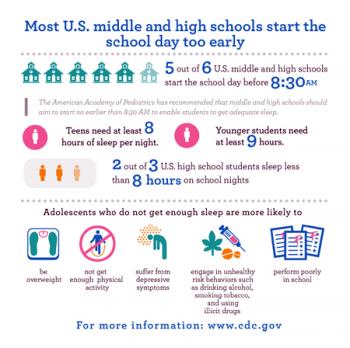Written by Peter Lam www.medicalnewstoday.com

I think many parents would agree that high school starts too early in the morning. Some may even say students probably sleep through the first class of the day. The CDC has conducted a massive study and found that students should not be getting up so early. Maybe this study will help change the start times of high schools.
Morning can often be a challenging period for tired students as they prepare themselves for the coming day, but should they be getting up so early?
According to a study published in the journal Pediatrics, the answer is no.
Sleep is particularly critical for teenagers, but many do not get enough. Medical News Today earlier reported how the number of hours slept per night has decreased among teenagers in the US over the past 20 years.
Between 8.5-9.5 hours of sleep per night are recommended for teenagers. However, the proportion of high school students who fail to get enough sleep is estimated to be 2 out of 3 and has remained like this since 2007.
To investigate the role of school times on students' sleep patterns, researchers from the Centers for Disease Control and Prevention (CDC) and the US Department of Education reviewed data collected from the 2011-2012 Schools and Staffing Survey. Nearly 40,000 public, middle, high and combined schools were reviewed in the study.
They found the majority of middle and high schools were starting the day too early. Fewer than 1 in 5 schools began at the recommended time of 8.30 am or later.

Lead author Anne Wheaton, PhD, an epidemiologist in the CDC's Division of Population Health explains the importance of sleeping. She says:
"Getting enough sleep is important for students' health, safety, and academic performance. Early school start times, however, are preventing many adolescents from getting the sleep they need."
Other key findings from the study include:
- 42 states reported that 75-100% of the public schools in their respective states started before 8.30 am
- The average start time was 8.03 am
- The percentage of schools with start times of 8.30 am or later varied greatly by state. No schools in Hawaii, Mississippi, and Wyoming started at 8.30 am or later; more than 75% of schools in Alaska and North Dakota started at 8.30 am or later
- Louisiana had the earliest average school start time (7.40 am), while Alaska had the latest (8.33 am).
Study strongly recommends schools start later
The study concludes by strongly recommending schools start later, but also warns other factors must be addressed to have a significant effect.
The study advises health care professionals, especially those working in schools, should be raising awareness of the importance of adequate sleep. Earlier this year, MNT reported how teenagers' sleep was being "adversely affected" by media devices.
To combat this, the study recommends pediatricians take an active approach supporting and educating families on healthy sleeping habits. In particular, parental involvement in setting bedtimes and supervising sleep practices is encouraged, such as the use of a "media curfew."
The decision of school start times are not determined at federal or state level but at district or individual school level. The data utilized was taken between 2011-2012, so further research is required to see if schools have heeded the recommendation, and if so, what effect this has had.
Sleep can easily be neglected in today's world. Last year, the CDC described the issue of insufficient sleep in society as a "public health epidemic." The US Government has sought to address the issue of insufficient sleep by selecting it as one of the new topics of the Healthy People 2020 initiative.





